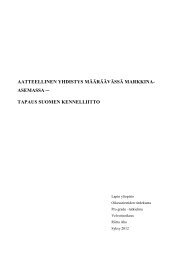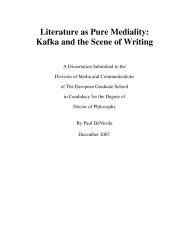- Page 1 and 2: TheLevinas ReaderEmmanuel LevinasED
- Page 3 and 4: ContentsPrefaceAcknowledgementsvvuI
- Page 5 and 6: PrefaceEmmanuel Levinas is one of t
- Page 7: AcknowledgementsThe editor and publ
- Page 11 and 12: 4 IntroductionSo in practice, Husse
- Page 13 and 14: 6 IntroductionPhilosophical saying
- Page 15 and 16: 8 Introductionultimate question: it
- Page 17 and 18: 1The Phenomenological Theory of Bei
- Page 19: The phenomenological theory of bein
- Page 22 and 23: 16 From existence to ethicsnot a sc
- Page 24 and 25: 18 Prom existence to ethicsthat the
- Page 26 and 27: 20 From existence to ethicsis an ab
- Page 28 and 29: 22 From existence to ethicsone of w
- Page 30 and 31: 24 From existence to ethicsnecessar
- Page 36: 30 Prom existence to ethicsthe work
- Page 39 and 40: There is: existence without existen
- Page 41 and 42: There is: existence without existen
- Page 43 and 44: 3Time and the OtherThe following ex
- Page 45 and 46: Time and the other 39object. All en
- Page 47 and 48: Time and the other 41other possibil
- Page 49 and 50: Time and the other 43This end of ma
- Page 52 and 53: 46 From existence to ethicsIVPart I
- Page 54 and 55: 48 Prom existence to ethicsintercha
- Page 56 and 57: 50 From existence to ethicsFor with
- Page 58 and 59:
52 From existence to ethicsF ecundi
- Page 60 and 61:
54 From existence to ethicsAgainst
- Page 62 and 63:
56 Pram existence to ethicsBergson,
- Page 64 and 65:
58 From existence to ethics33 The t
- Page 66 and 67:
60 From existence to ethicscan give
- Page 68 and 69:
62 Prom existence to ethicssince it
- Page 70 and 71:
64From existence to ethicsthat in t
- Page 72 and 73:
66 From existence to ethicsrather a
- Page 74 and 75:
68 From existence to ethicsit is re
- Page 76 and 77:
70 From existence to ethicshistory
- Page 78 and 79:
72 Prom existence to ethicsthe ligh
- Page 80 and 81:
74 From existence to ethicsdistinct
- Page 82 and 83:
76 From existence to ethicsIThe cor
- Page 84 and 85:
78 From existence to ethicsidentifi
- Page 86 and 87:
80 Prom existence to ethicsphy all
- Page 88 and 89:
82 Prom existence to ethicsthe star
- Page 90 and 91:
84 From existence to ethicsintensit
- Page 92 and 93:
86 From existence to ethicsVITo be
- Page 94 and 95:
6SubstitutionFirst published in Oct
- Page 96 and 97:
90 From existence to ethicsNot able
- Page 98 and 99:
92 Frdm existence to ethicsing itse
- Page 100 and 101:
94 Prom existence to ethicsinto pha
- Page 102 and 103:
96 Prom existence to ethicsPrior to
- Page 104 and 105:
98 From existence to ethicsitself c
- Page 106 and 107:
100 From existence to ethicsa categ
- Page 108 and 109:
102 Prom existence to ethicsanother
- Page 110 and 111:
104 Prom existence to ethicsnizing
- Page 112 and 113:
106 From existence to ethicsThe sel
- Page 114 and 115:
108 From existence to ethicsand alt
- Page 116 and 117:
llOFrom existence to ethicsenough.
- Page 118 and 119:
112 From existence to ethicsTo supp
- Page 120 and 121:
114 From existence to ethicsbut exa
- Page 122 and 123:
116 From existence to ethicsand cor
- Page 124 and 125:
118 Prom existence to ethicsThe fac
- Page 126 and 127:
120 From existence to ethicsYet dis
- Page 128 and 129:
122 From existence to ethicsaccused
- Page 130 and 131:
124 From existence to ethicsinfinit
- Page 132 and 133:
PART 11Reading, Writing, Revolution
- Page 134 and 135:
130 Reading, writing, revolutionHut
- Page 136 and 137:
132 Reading, writing, revolutionwhi
- Page 138 and 139:
134 Reading, writing, revolutionis
- Page 140 and 141:
136 Reading, writing, revolutionequ
- Page 142 and 143:
138 Reading, writing, revolutionsto
- Page 144 and 145:
140 Reading, writing, revolutionema
- Page 146 and 147:
142 Reading, writing, revolutionpai
- Page 148 and 149:
8The Transcendence of WordsFirst pu
- Page 150 and 151:
146 Reading, writing, revolutionune
- Page 152 and 153:
148 Reading, writing, revolutionsur
- Page 154 and 155:
9The Servant and her MasterFirst pu
- Page 156 and 157:
152 Reading, writing, revolutionvig
- Page 158 and 159:
154 Reading, writing, revolutionmen
- Page 160 and 161:
156 Reading, writing, revolutionstr
- Page 162 and 163:
158 Reading, writing, revolutionof
- Page 164 and 165:
10The other in ProustFirst publishe
- Page 166 and 167:
162 Reading, writing, revolutionis
- Page 168 and 169:
164 Reading, writing, revolutionmas
- Page 170 and 171:
11God and PhilosophyPublished in Le
- Page 172 and 173:
168 Reading, writing, revolutioncon
- Page 174 and 175:
170 Reading, writing, revolutionawa
- Page 176 and 177:
172 Reading, writing, revolutionpre
- Page 178 and 179:
174 Reading, writing, revolutionpas
- Page 180 and 181:
178 Reading, writing, revolutionis
- Page 182 and 183:
180 Reading, writing, revolutionint
- Page 184 and 185:
182 Reading, writing, revolutionimm
- Page 186 and 187:
184 Reading, writing, revolutionme
- Page 188 and 189:
186 Reading, writing, revolutionsmo
- Page 190 and 191:
188 Reading, writing, revolutionand
- Page 192 and 193:
12Revelation in the Jewish Traditio
- Page 194 and 195:
192 Reading, writing, revolutionass
- Page 196 and 197:
194 Reading, writing, revolutiondec
- Page 198 and 199:
196 Reading, writing, revolutionGod
- Page 200 and 201:
198 Reading, writing, revolutioncom
- Page 202 and 203:
200 Reading, writing, revolutionbet
- Page 204 and 205:
202 Reading, writing, revolutionTHE
- Page 206 and 207:
204 Reading, writing, revolutioncon
- Page 208 and 209:
206 Reading, writing, revolutionSur
- Page 210 and 211:
208 Reading, writing, revolutiongy
- Page 212 and 213:
210 Reading, writing, revolutionNOT
- Page 214 and 215:
212 Reading, writing, revolutionJud
- Page 216 and 217:
214 Reading, writing, revolutionthe
- Page 218 and 219:
216 Reading, writing, revolutionble
- Page 220 and 221:
218 Reading, writing, revolutionint
- Page 222 and 223:
220 Reading, writing, revolutiona s
- Page 224 and 225:
222 Reading, writing, revolutionThe
- Page 226 and 227:
224 Reading, writing, revolutiontau
- Page 228 and 229:
226 Reading, writing, revolutionres
- Page 230 and 231:
228 Reading, writing, revolutionlas
- Page 232 and 233:
230 Reading, writing, revolutionnat
- Page 234 and 235:
232 Reading, writing, revolutiontic
- Page 236 and 237:
234 Reading, writing, revolutioncon
- Page 238 and 239:
236 Reading, writing, revolutionFor
- Page 240 and 241:
238 Reading, writing, revolutiontha
- Page 242 and 243:
240 Reading, writing, revolutiontha
- Page 244 and 245:
242 Reading, writing, revolutionnec
- Page 246 and 247:
244 Reading, writing, revolutionof
- Page 248 and 249:
246 Reading, writing, revolutionall
- Page 250 and 251:
248 Reading, writing, revolutionkno
- Page 252 and 253:
iSQReading, writing, revolutionmora
- Page 254 and 255:
252 Reading, writing, revolutionThe
- Page 256 and 257:
254 Reading, writing, revolutionin
- Page 258 and 259:
256 Reading, writing, revolutionwer
- Page 260 and 261:
258 Reading, writing, revolutioncom
- Page 262 and 263:
260 Reading, writing, revolutionsov
- Page 264 and 265:
262 Reading, writing, revolutionthe
- Page 266 and 267:
264 Reading, writing, revolutionjus
- Page 268 and 269:
266 Reading, writing, revolutionsud
- Page 270 and 271:
268 Reading, writing, revolutionmar
- Page 272 and 273:
270 Reading, writing, revolutionnou
- Page 274 and 275:
272 Reading, writing, revolutionbut
- Page 276 and 277:
274 Reading, writing, revolutionsee
- Page 278 and 279:
276 Reading, writing, revolutionatt
- Page 280 and 281:
278 Reading, writing, revolutionsma
- Page 282 and 283:
280 Reading, writing, revolutionexi
- Page 284 and 285:
282 Reading, writing, revolutionthe
- Page 286 and 287:
284 Reading, writing, revolutionove
- Page 288 and 289:
286 Reading, writing, revolutionmin
- Page 290 and 291:
288 Reading, writing, revolutionof
- Page 292 and 293:
290 Reading, writing, revolutiontha
- Page 294 and 295:
292 Reading, writing, revolutionwe
- Page 296 and 297:
294 Reading, writing, revolutionthi
- Page 298 and 299:
296 Reading, writing, revolutionJew
- Page 300 and 301:
GlossaryFor full references to the
- Page 302 and 303:
300SederimSoferimTalmudTannaimTorah
- Page 304 and 305:
302 Bibliography1939'A propos de la
- Page 306 and 307:
304 BibliographyMaurice S. Friedman
- Page 308 and 309:
306 Bibliography'Un eveil qui signi
- Page 310 and 311:
Indexacts, 14, 254aesthetics, 12Agg
- Page 312 and 313:
310 Index180-3, 202, 206-7, 209, 22





